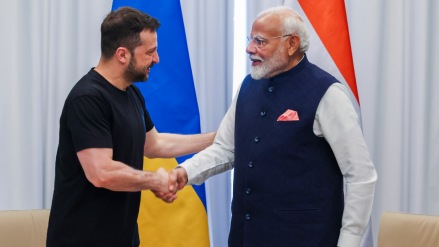By Manan Bhatt
In a significant diplomatic gesture, Prime Minister Modi’s recent visit to Kyiv saw him warmly embracing President Zelensky, a move that could serve to counterbalance the West’s exaggerated moral outrage over Modi’s previous meeting with President Putin in Moscow. This embrace is particularly noteworthy, given its timing—just as Zelensky initiated an unprecedented incursion into Russian territory, an act that Moscow claims involved the brutal killing of civilians.
Zelensky’s comments to Indian media during Modi’s visit, where he accused Putin of disrespecting Modi by bombing a hospital during the Moscow visit, were not only undignified but also lacked diplomatic finesse. Additionally, Zelensky’s repeated criticism of India for purchasing Russian oil, despite India’s consistent and clear explanations over several months, was unnecessary and did little to foster a constructive dialogue.
Zelensky’s rejection of Modi’s peace initiative, coupled with his insistence that Ukraine will not compromise on its principles or values, demonstrated a missed opportunity for meaningful engagement. His suggestion that the next peace summit could be held in India, but only if India fully aligns with Ukraine’s position, was both condescending and counterproductive. Zelensky’s insistence that India should not “balance” its relations between Ukraine and Russia reflects a sense of entitlement rather than mature diplomacy. Modi’s visit was motivated by genuine intentions to promote peace, yet it was met with actions and rhetoric that undermined these efforts.
Moreover, Zelensky’s decision to launch a military operation in Russia just before Modi’s visit was particularly disrespectful and undermined the principle that “this is not an era of war.” The timing of the Kursk attack, on the eve of Modi’s visit, does little to enhance Ukraine’s credibility as a nation seeking peace. If the Ukrainian and U.S. strategy was to leverage Modi’s visit to advance their military objectives, it is a deeply regrettable tactic.
While Ukraine might see Modi’s visit as bolstering its diplomatic position, this should not distract from the fact that Zelensky remains in power despite his term having ended, with no plans to step down or call for elections as long as the war continues. In fact, Zelensky has significantly curtailed democratic freedoms by regulating the media, jailing political rivals, and outlawing opposition parties, effectively stifling dissent.
Furthermore, Europe’s increasing imports of Russian gas are contributing more to Moscow’s coffers than India’s purchases of Russian oil, yet Zelensky singled out India for criticism following his meeting with Modi. This selective condemnation is both unfair and misleading.
In contrast, Modi took a principled approach by urging Zelensky to engage in direct dialogue with Putin, recognizing that Zelensky’s current “peace summit” framework, which excludes Russia, is unlikely to succeed. Modi’s plea for peace was clear and sincere: “I want to assure you that India is ready to play an active role in any efforts toward peace,” he stated, expressing his hope for a swift resolution to the conflict.
The ongoing war continues to wreak havoc on Ukraine, with significant repercussions for the global community. It is crucial that we avoid further division and work towards a peaceful solution that acknowledges the complex realities of this conflict.
The writer is a veteran of the Indian Navy.
Disclaimer: Views expressed are personal and do not reflect the official position or policy of FinancialExpress.com Reproducing this content without permission is prohibited.
